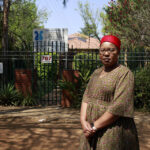Sex workers tell of being tortured, including being beaten with sjamboks.
Nosipho Vidima arrived at work at around seven o’clock that evening. The streets of Morningside in Durban were still bustling with people driving and walking home from work.
As the roads quietened, Vidima and her colleagues got ready for the tasks of the day.
A police van drove in the direction of the corner where Vidima was stationed. As it got closer, Vidima recognised the driver — it was a police officer with whom she had had many encounters in the past.
The officer once arrested Vidima and another worker. He took them to the Durban Central police station where he and other police members beat them up.
“He didn’t like me because I was more opinionated than the others,” Vidima recalls. “I would voice my dissatisfaction about the way they were treating us.”
Every time he drove past Vidima’s corner, he would say to her: “You are too clever for your own good. Why are you here?”
But on this particular night, she didn’t respond when he spoke to her. The officer got out of the van and told her to get into the back.
Vidima didn’t fight or argue.
“I could see that the van wasn’t going in the direction of the police station when he drove off. I looked through the windows and I realised he was driving to Burman Bush,” Vidima remembers.
He parked in an isolated part of Burman Bush nature reserve, a known hot spot where people who pose as clients beat, rape — and sometimes kill — sex workers, she says.
The police officer stopped and opened the back of the van to let Vidima out. He told her to sit in the front. Then he unfastened his pants and said: “Blow job.”
“I took out a condom but he didn’t want it, so I ended up blowing him without one,” she remembers. “I prayed it didn’t go further than that because I couldn’t take it. But it didn’t end there … He raped me.”
Vidima pauses.
“I have actually lost count of how many times the police have raped me. I’ve become numb,” she says. “It is a constant battle to be a sex worker, especially if you’re going to be working on the streets.”
[WATCH] ‘We want our own brothels’
Vidima is one of a third of almost 60 surveyed sex workers who say they have been raped or sexually assaulted by police, according to a new report by Sonke Gender Justice and Sex Workers Education and Advocacy Taskforce (Sweat).
Sex workers also frequently reported that they experienced other forms of violence and even torture at the hands of police including being beaten with sjamboks or the butts of guns as well as being tasered.
As part of the study, researchers canvassed about 120 sex workers, the majority of whom were female and lived in Gauteng.
About half the workers filled out questionnaires and the other half, who all indicated past problems with police, were interviewed by researchers. Almost six out of every 10 surveyed workers had been arrested an average of four times, most of whom paid a fine before being released.
But many workers allege their arrests were unlawful or occurred while they were off duty, for instance while out shopping, visiting friends or sitting by the side of the road.
Thendo is a 25-year-old sex worker in Mpumalanga who was interviewed as part of the study.
“One of the policemen hit me on the back with his gun. This officer then struck me a number of times with the gun barrel … One of the other officers had a knife in his hand, and he was threatening me with the knife,” she told researchers.
“He ran the knife down my forehead. I jerked my head back.”
This gender-based violence is a manifestation of the power police know they hold over marginalised people like sex workers, particularly when workers are foreign or undocumented, says researcher Marlise Richter, who is the head of policy, development and advocacy at Sonke Gender Justice.
“In Mpumalanga, there was very clear motivation by the police to make sex workers as uncomfortable as possible. Some of the police officers would persecute sex workers and torture them by making them eat condoms or by putting them in cold baths,” she says.
The South African Police Service did not reply to Bhekisisa requests for comment, although national spokesperson Brigadier Vishnu Naidoo said that police are adequately trained on how to treat the public.
“Any person who is unsatisfied with the police can lodge a complaint with a senior official or station commander at their local police station. If that fails, complainants can contact the National Service Complaints or Independent Police Investigative Directorate,” Naidoo says.
Meanwhile, workers say they have little legal recourse against abusive officers. Vidima alleges that, when workers do report crimes committed by police, dockets are often lost.
According to Richter, SAPS has received a copy of the research but has not responded.
Sex workers interviewed by Sonke Gender Justice and Sweat as part of the research reported police regularly confiscate antiretrovirals (ARVs) from workers who have been arrested.
In 2016, sex workers accused police in Emalahleni, Mpumalanga of destroying their HIV treatment after they were arrested as part of a series of violent raids. Workers said they were also denied medical attention while in police cells. At the time, Witbank station commander Brigadier Delisiwe Motha denied the allegations.
National policies have increasingly prioritised sex workers in the country’s HIV response, including South Africa’s latest HIV and tuberculosis strategic plan. The document focuses on increasing access to HIV prevention and care services to workers. The South African National Aids Council’s sex work plan, for instance, says that 95% of HIV-positive workers should be on ARVs by 2019.
Less than a quarter of sex workers living with HIV in Johannesburg are on treatment, a 2014 survey conducted by the national health department found.
Meanwhile, at least one-third of female sex workers in South Africa will contract HIV by the time they are 24, the study found. Their high HIV infection risk is driven in part by the criminalisation of their profession, studies have shown. Research published in 2013 in the journal Culture, Health & Sexuality found that stigma and discrimination against sex workers — particularly against transgender and male workers — weakened HIV prevention efforts and decreases access to healthcare.
Up to 11% of all new HIV infections in South Africa can be linked to sex work, a 2014 study published in The Lancet found.
“This report shows the criminal law makes sex workers vulnerable to abuse — not just from the general public but from law enforcement as well,” Richter says.
The report recommends the decriminalisation of sex work to reduce workers’ vulnerability to abuse — it’s a shift in policy supported by the ANC. At its December elective conference, the ruling party affirmed its commitment to decriminalising sex work, which could reduce HIV infections by, for instance, allowing workers better access to health services and safe working conditions.
As of late last year, the department of justice and constitutional development was still reviewing a South African Law Reform Commission report that recommended the country continue to criminalise the profession.
Sweat and Sonke researchers also recommend annual provincial and national meetings between police and vulnerable groups including sex workers as well as the creation of standard protocols for police on how to handle sex work. Training for police could also lead them to better understand the levels of violence workers face, the report argues.
Researchers added that more work also needs to be done into the experiences of male and transgender workers, who researchers say remain hidden, but are extremely vulnerable to violence.
Vidima explains: “The moralistic view that people have about sex work kind of takes away their humanity towards sex workers. People stop seeing human beings and start seeing all of these stereotypes [about sex workers].” – Additional reporting by Mia Malan.
Pontsho Pilane is the communications manager at Soul City Institute for Social Justice. Pilane was a health journalist at Bhekisisa from 2017 until 2019.
![“[The female officer] was going to teach all the 'prostitutes' a lesson. The male police officers grabbed those ladies so the lady could force the [used] condoms into each lady’s mouth](https://bhekisisa.org/wp-content/uploads/2019/02/5c678334-00-a-third-of-surveyed-sex-workers-report-being-raped-sexually-assaulted-by-police-1.jpeg)





